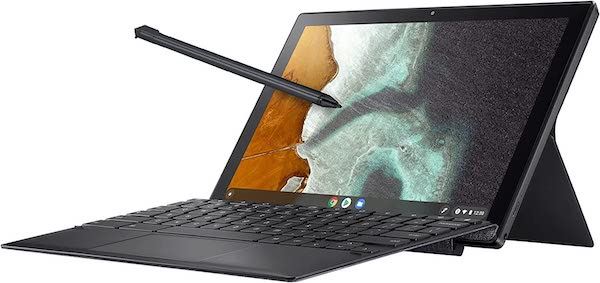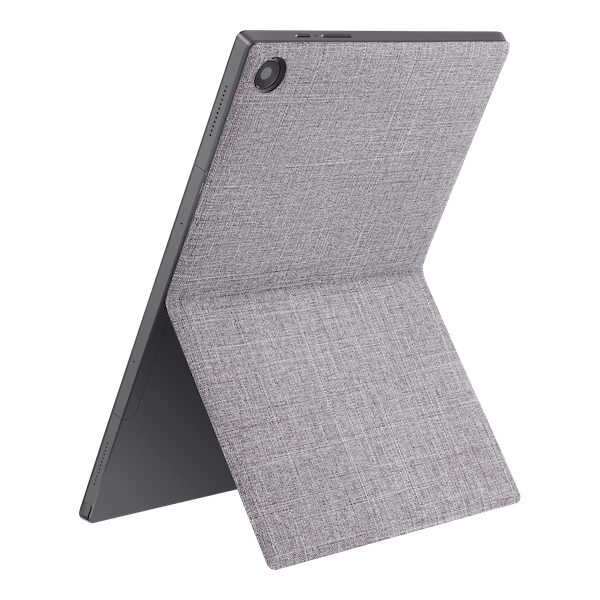I recently decided to purchase a new tablet computer. I already owned a couple of older tablets made by different manufacturers but they have recently become slow and the screens are not as sharp as current models. Also, the batteries in these aging Android systems don't seem to hold a charge as long as they used to. Also, I am no longer receiving any Android updates on these aging systems. I started looking online for a current model.
Most tablet computers are one of two models: Apple iPads (all made by Apple and are significantly overpriced) or Android tablets (made by a variety of manufacturers and sold at a wide range of prices). Since I already own (aging) Android tablets and an (almost new) Android cell phone, I first went looking for Android devices.
After spending an evening looking at all sorts of devices, both Android and even including Apple iPads, I made my choice: a Chromebook! That's right: I eventually purchased a combination tablet and laptop that doesn't run one of the two most popular tablet operating systems. It isn't Android and it isn't Apple's iOS on iPads. Instead, it runs ChromeOS.

Now that I have used the new Asus CM3 Chromebook combination tablet/laptop for several days, I must report that I am delighted with this new, low-cost, multi-purpose system.
There are several reasons why I decided to switch from Android to ChromeOS. It wasn’t until I saw an ad for the Asus CM3 Chromebook that the idea of purchasing a Chromebook instead of an Android tablet crossed my mind.
Although I plan on using the Asus CM3 Chromebook mainly as a tablet, the detachable keyboard is still a nice thing to have especially when entering passwords or working on Google Docs. Likewise, the built-in stand makes it easy to prop up the device when streaming shows online or watching YouTube videos.

I find the laptop is much easier to use than a tablet when sitting on the living room couch. Yet, when traveling on an airliner or the auto train, the tablet configuration seems to work better. With the Asus CM3, I can detach the keyboard to switch from laptop to tablet mode in 2 or 3 seconds. In other words, it is the best of both worlds.

Also, there is the price: at $299.99 (U.S.) from Amazon, the Asus CM3 Chromebook is much cheaper than an Apple iPad and also is about mid-range amongst the prices of Android tablets that usually have fewer capabilities. In addition, I also own a "normal" Chromebook laptop and am very familiar with the operation of the ChromeOS. I already know there are thousands of FREE Chromebook apps just waiting to be installed on a Chromebook.

Other advantages of Chromebooks that I was already familiar with include:
Chromebooks are lightweight laptops designed for people who spend most of their time online.
Chromebooks never get viruses and are resistant to most other forms of malware.
Simplicity: Chromebooks are much easier to use than Windows or Macintosh systems and are often recommended for use by non-computer-literate individuals. Chromebooks are very popular for use in school systems as a result as well as for use by senior citizens who are not familiar with Windows or Macintosh usage.
Chromebooks make system software updates in the background that happen invisibly to the user. The user is never frustrated by an on-screen message that says "Please wait... installing system updates" or similar words.
Speed: Chromebooks can power up and be ready to use in around eight seconds.
Weight: The Asus CM3 Chromebook weighs 1.1 pounds. It should be easy to carry when traveling.
Price: The majority of Chromebooks cost significantly less than your average Windows or Macintosh laptop.
Battery: Expect to get six hours (or more) from the battery on an average Chromebook. The Asus CM3 specs claim 12 hours of battery life in normal usage.
Hard drive: The "hard drive" in most Chromebooks (including the Asus CM3) isn't really a hard drive at all. It is a solid state drive. The result is blinding speed and very low power consumption. For instance, my $299 Chromebook performs most computing tasks faster than my $1499 Macbook Pro (with a few exceptions).
Audio quality: The Asus web site claims "The dual high-quality 5-magnet stereo speakers on ASUS Chromebook Detachable CM3 generate high-fidelity audio." Well, I wouldn't exactly call it "high-fidelity audio" but the speakers do face upward from above the display screen, not downward facing where it would get muffled by a desk or the user's lap in the manner of many other laptops. All-in-all, I would rate the audio quality of the Asus CM3 as "better than I expected" but I still would not call it "high-fidelity audio."
Stylus: There is a built-in stylus, something not found on many Chromebooks. I find the stylus works better than my finger when using the touch-screen. However, I did find it a bit "tricky" to extract the stylus from its internal storage space.
Built-in Flexible stand design: The innovative flex-angle stand on the ASUS Chromebook Detachable CM3 is designed to meet a wide range of user needs for entertainment, study and work, and the device enables both vertical and horizontal orientations. Portrait mode provides the perfect vertical setup for chatting, web-browsing, reading and entertainment, and landscape mode is ideal for watching videos or reading ebooks hands-free. (I don't plan on using my Amazon Kindle ever again. The Asus CM3 works better with a larger and brighter screen than my Kindle.)
Fabric covering: with most of my older tablet and laptops, I have usually purchased carrying cases or "leather envelopes" to protect them from bumps and bruises when traveling. The Asus CM3 has a fabric covering that appears to be glued onto the device. As a result, I feel it is already protected from bumps and bruises. I don't plan to obtain any additional carrying cases or "envelopes" to protect it.
Other Operating Systems: modern-day Chromebooks also can run Linux and Android applications.
Drawbacks:
One significant drawback of the Asus CM3 (for some people): apparently, in order to make this device as small and lightweight as possible, Asus settled on a 10.1-inch (25.7 centimeter) screen. While it is sharp and bright, that is still a smaller screen than most other laptops. If you have good vision, that shouldn't be a problem for you. However, if you suffer from any vision problems, you might prefer to select a laptop with a larger screen.
Another drawback: This device has only one USB port, a USB-C connector. It is in use when charging the battery. That makes it impossible to use the USB-C port for any other purpose when charging. For instance, you cannot use a flash drive while charging. Luckily, charging doesn't take long and the device runs for about 12 hours from a single charge. I found this to be a non-issue but you might have a different opinion.
Other factor:
I don't consider this to be either an advantages or disadvantage. Instead, it is simply a "fact of life."
While modern Chromebooks no longer are required to be used online all the time, the fact remains that to use its full potential you will want a frequent online connection. If you have wi-fi in your home, you should be all set. If you do not have easy access to wi-fi, you might be disappointed with a Chromebook.
Summation:
This article was written on my new Asus CM3 Chromebook.
I purchased my Asus CM3 Chromebook from Amazon. I ordered it about 10 AM and the Amazon van delivered the new laptop/tablet to my front door about 9 PM the same day. (Delivery times may be longer for you, depending upon your location.) If you would like to purchase the same device, you may do so by going to Amazon.com and searching for: B094K28536.
Amazon Prime members receive free shipping.
I suspect the $299.99 price is good only for shipping to U.S. addresses.
You should be able to purchase the Asus CM3 from other computer retailers. The price might be a bit higher or lower than $299.99 but should still be close to that price.
Final comments:
I am not compensated in anyway for writing this article. I purchased it with my own funds and plan to use it more or less daily for a number of years.
I listed the order information on Amazon as "by going to Amazon.com and searching for: B094K28536." You will notice that is not an affiliate link. I don't need a commission if you decide to purchase one. Instead, you might consider dropping me a note and telling me how you like your new Asus CM3 Chromebook.
That's all the "commission" I want.
 Latest News Articles
Latest News Articles Do you have an RSS newsreader? You may prefer to use this newsletter's RSS feed at:
Do you have an RSS newsreader? You may prefer to use this newsletter's RSS feed at: